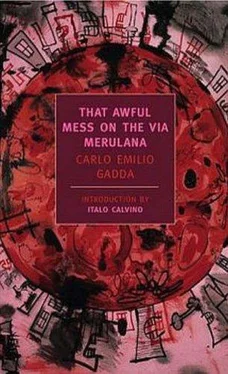"Where?"
"At Piazza Vittorio, and he even slipped me a sandwich: from under his apron: he knows how to do tricks: with those eyes of his, scared stiff, for fear his granny would see him: with that mop of hair he has. He said to me: don't tell anybody you saw me here. I wonder why. Always mysterious, that kid. A sandwich with a slice of pork. Big enough to last two days. But without letting the old woman see him. That old witch would have slapped him good, if she'd seen. She'd already given me a dirty look, when she saw I was talking to the kid, whispering. ."
"What time was it?"
"It must have been around eleven. I was so hungry I couldn't see straight. The big bell, at Santa Maria Maggiore, kept ringing and ringing… to bring us the grace from San Giuseppe, they say, who's so good: because Saturday was his feast, but I was already in here. In fact, he made me run into Ascanio, who gave me that sandwich. That bell, when I hear it, it sounds like my granny on the swings: up and down, down and up, drrring drrring, every time you give her behind a push, she lets out a word or two from even from there: brrr brr frrrfrrr… I was so hungry! I told him right out that I was hungry, that I was a good customer: while he went on yelling 'Get you roast pork here! Nice roast pork (that nobody wanted, not at that price) golden brown.' He understood me: he had already caught on, the moment he saw me. That was the last good food I ate: something to stick to my ribs, before I ended up in here. I was lucky!"
Chance (non datur casus, non datur salus) well, on the other hand, it seemed to be chance itself that night which succored the puzzled, straightened out the investigations, changing the turn of the wind: chance, luck, the net, a little unraveled, a little frayed, of the patrol, more than any artful wisdom or hairsplitting dialectic. Ingravallo had them call in Deviti (he was there, this time) and charged him, the next morning, to look for the kid, Ascanio Lanciani. The features of the boy.. could be furnished him at once by Ines, a proper little portrait. And she also had to explain the location of the stand, and the grandmother, who sold roast pork: yes, at Piazza Vittorio, yes: where they had their counter. Pestalozzi was furnished with a copy of the list, typewritten, of turquoises and topazes, in which all the o's (opals, topazes, onyx) figured as so many little holes or dots in the onionskin paper, round just like an o: ulcers of a precision and of an operative deliberateness not adequately comforted by the budgets. Some were topazes, properly called, others were topazos: the jewels of the broken-and-entered and detopazed Menecazzi, who returned, this time, to the definitive possession and full enjoyment, by right and by might, of her own z's: her Venetian g, for the rest, joyfully commuted into a central-Italian c. So it happened, in the documents of the implacable administration by which we have the honor and pleasure to be ministered with the papers and rubber stamps necessary to life, that the recovery of a Carlo Emilio from a precedent Paolo Maria, preceded in turn the name of the great dead of Cannae, is offset by a Gadola: which, meanwhile, is permitted to glow in civic execration in place of a Gadda. {50}The sheet of the Menecazzi list was supplemented (Ingravallo, handing Lance-Corporal Pestalozzi the second sheet, took a look at it) by another list, more grimly horrid and splendid: of those other jewels, kept in a little iron coffer, in the first dresser drawer, by Signora Liliana.
THE sun still hadn't the slightest intention of appearing on the horizon when Corporal Pestalozzi had already left (on his motorcycle) the barracks of the are-are-see-see {51}at Marino to hurl himself on the tavern-workshop where he wasn't for one moment expected, at least not in his capacity as functioning corporal. The girls, and before them, the sorceress herself had sniffed in the air, yes, a certain, indefinable interest, then perceived a certain circumscribed buzzing of carabinieri (like the ugly horseflies when, of a sudden, a new miracle is scented, in the country), of the sergeant and the corporal, in particular, all around the sweet fragrance of the knitting shop, and finally to the very door of the tavern and even inside, at the counter: an attraction which wasn't the usual, for from the 17th to the 18th, from Thursday to Friday, in the space of twenty-four hours, it had become objectified in a scarf of green wool: yes: probably, if not surely, pinched: whence the urgency, for the beneficiary of the change of ownership, to take it to Zamira to be dyed. The new and, perhaps, even a bit intensified buzzing of the huge men in olive drab or black-and-red wasn't ascribable to private urges, that is to say to the exuberance of the eternal lymph from within the straits of discipline. No, no! The alert and ever closer circling of the workshop, or better of the little hovel that housed the same, had become, in the last couple of days, a royal, carabinierial buzz, obviously to be imputed to a determined case in point of the pinching variety: in short, a police-style buzzing. So that they, the girls, were? Silent! Lips sealed. And knitting, cutting, plying their needle: zum zum zum at the sewing machine. The two bechevroned men, sergeant and corporal, one after the other, and almost in mutual rivalry, had tossed out with effective nonchalance, as if it were a matter of mere passing curiosity, a couple of unforeseen questions, then foreseen and expected, concerning the scarf: and what was it like, and what color was it, was it made of cloth, or knitted, by hand or machine-made? An old lady had lost it, according to what they said… as she got off a tram. Zamira blew little bubbles of saliva from her hole and beaded her lips, at the corners: it was her way of palpitating, of participating. She had, one might say an invitation in her eyelids, the most melting, the most edulcorating invitation of mi-careme. But that other girl, that quasi-bride, the one who to the paternal heart of the sergeant was the opened, purplish rose in the bouquet of the white and still-closed buds, had shot into his eyes "her" eyes. A rapid, luminous adept's glance: and that arrow shot, so dewy with intelligence, had been more than sufficient for the sergeant. To concert with immediate parapathia an encounter, vespertine and casual, oh very casual indeed, halfway along the little road to Santa Margherita in Abitacolo: at an hour when no living soul was to be seen. Then and there the scarf was brought back to him (ideally): so green: and in the welling-up of whispers also there came to the surface the buggy, March, the horizontal rain and the new moon and all the strong March winds, and the offering of hot wine, poor horse! in a watering bucket: and, what was more important, the Ciurlani Dyers in Marino. And finally the first name, last name, alias, fixed abode of the denominated male or "boyfriend": with some further information, some hints about his appearance, his character, type, manners, figure, shoelaces. His overall, for that matter, not to mention the cap, were missing from the portrait: a precise question of the sergeant remained unanswered. In the workshop-tavern at I Due Santi, all the girls, every time, and Zamira also, on the other hand, had become lost in a dreamy innocence, had remained silent, or had answered in questions, with their eyes, their questioners: or else they had shrugged and had contracted their lips in a moue of ignorance.
Towards Monday, then, that rather rascally zeal of the carabinieri had become completely stilled. A private or two, true enough, had dropped in, descending from his bike; to order an orangeade. The swaying of the handle of the door with glass panes (colored ones) had given the swaying forewarning of a customer: and he had appeared: a carabiniere passing by. The orangeade having been ingested, when its respective gas, as usual, had erupted back again in the kind of nasal crypto-belch which follows a beverage of that kind, then the soldier had unbuttoned his tunic, had opened it slightly, for greater comfort and the drawing of breath: and had drawn out a kind of hamburger swollen with papers more than a generous salami sandwich: a rotten wallet: an organ indispensable, to the sweating, to the wretched, to effect the laborious payment of a "soft" drink. His fingering his buttonholes, restoring to a freer splendor the noble buttons of his uniform, had granted the girls — not to say to the mistress-seamtress — occasion to eye, in a furtive glimpse, but surely a connoisseur's glance, the vivid outlines of his chest, to appreciate the mood of the quenched man: peace, vigor, relaxation, inhibition, pride, and, to record it, this mood, on the positive side of the ledger of humanity's general heritage: excluded, in practice, any dutiful assignment any "causal motive" or rationale of service.
Читать дальше












